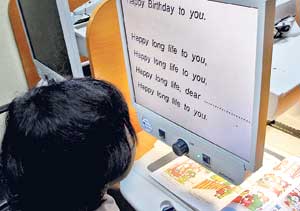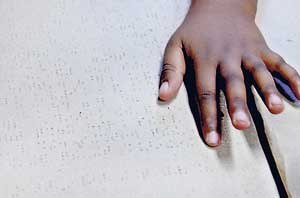Eleven-year-old Shalini (name changed) is transported to another world the moment she feels she has entered the school library. She walks up to a table in a quiet corner and impatiently waits for someone to place a Braille book in front of her.
She reads and reads; asks for more books and even refuses to leave the library saying “ane teacher mata thawa poth kiyawanna one (please teacher, I want to read more).”
An ardent lover of books, Shalini is a fast reader, says her teacher at the Ceylon School for the Deaf and Blind in Ratmalana. Bubbly and talkative though visually impaired, this young girl tells us about her Amma and Appacchi who are in the village in Doragala, Gampola.
 |
| Computer technology and braille text books: Opening doors to step into society as contributors and not dependents. |
 |
The School for the Deaf and Blind in Ratmalana has many students like Shalini who, as quoted in the school’s Mission statement, are “progressing from handicapped dependent to self managing contributors in society”. Some have successfully completed their studies and been able to obtain employment in banks, garment factories as well as in leading private sector companies as telephone operators, graphic designers etc.
The Ceylon School for the Deaf and Blind in Ratmalana established in 1912 cares for about 150 blind and 200 deaf students. In 1956, another school was also set up in Kaithady Jaffna called Nuffield School for Deaf and Blind and caters to about 180 students with both types of impairments.
Children in these schools receive the same level of education as normal children and the curriculum followed is as in a mainstream school, says Executive Director of the School L.P.R. Mendis.
Accommodation is provided during term time as 90% of the students are from remote areas. The services are provided to these children free of charge and the school’s main source of funding is through donations received from the government, public and various NGOs.
Classes are conducted from primary up to Ordinary Level with the use of special technical aids like vision enhancers in assisting the handicapped to read and write.
In 2007, 10 students out of the 17 who sat for O/Ls qualified for Advanced Level. Several have even gained university entrance. Government texts books are converted into Braille books in the school’s printing room. The process is quite time consuming, the Sunday Times learns as the entire book needs to be typed before being translated into Braille.
The ‘talking library’ is for the students to listen to lessons in specially adapted CDs and MP3 players. “Traditionally though vocational training was given in weaving, sewing and agriculture, now we are more focussed on getting them into the mainstream,” says Mr. Mendis pointing to areas like graphic designing, printing, communication etc.
The school’s ‘Sponsor a child programme’ is a way for the public to help the students. A sponsor can choose to sponsor a child from the Deaf school or Blind school for one year or more to support his/her education. Under the Friends of School programme, people are also able to help in activities such as sports meets, prizegivings etc.
The school has been my pillar of strength: Melanie
In 2007, she walked away with the title of Telephone Operator of the Year, having competed with participants of 58 other companies. Incredibly she was the only blind student to have taken part in this competition.
Courageous Melanie Stephens is 30 years old and works as a Junior Executive at a leading insurance company.
“When I lost my vision at the age of 12 due to wrong medication given by a doctor, I completely lost faith in living and my desperation was such that I even wanted to commit suicide. I was without my parents…my mother left me when I was two and half years old and my father also left when I was about 8 years. Thereafter it was my aunt who looked after me. Later I was introduced to the Deaf and Blind School in Ratmalana – the school became a pillar of strength to me at a time when I was feeling very down.
“From that time onwards, little by little I started learning. Today, I am moving on with the encouragement and immense support I received from the staff and the principal of the school. They were there with me all the time; I remember the way my teachers used to encourage me by saying how the blind in foreign countries are employed as telephone operators and so on,” Melanie said.
Melanie won an award at an all-island short story competition held in 1995 and also Gold and Silver medals at many national sports competitions.
She is no more a burden on society, says a proud Melanie who informs us that she has been living on her own since she was 18. “I have hopes; hopes to build a house etc,” she says and with her will and determination, one can only hope more of her dreams will become a reality.
Lack of meal donations
Three main meals and tea are provided for the children at the Ratmalana hostel every day. However, due to a lack of meal donations at the moment the school is finding it difficult to feed the children says Nilanthi Jinasena, Board Member in charge of the Meals Programme at the Ceylon School for the Deaf and Blind in Ratmalana.
“Due to the financial situation of the country some standard donors have backed out now. Also some of the NGOs we received considerable support from have pulled out from 2009 reducing our revenue by about Rs. 7.5 million per annum,” Ms. Jinasena says adding that in January this year the school was facing a severe meal crisis.
Elaborating on the meals programme, Mrs Jinasena said that usually meals are cooked in school and the donor only has to choose a particular menu from the given options and make the payment. “The donor can also contribute to the Meals Fund where the money is utilized to buy provisions. If donors want to give a meal on a particular day, we can reserve the date. They can be present at the meal time and if need be we organize the prayers as well,” she says.
To donate a meal, please call 2623601 or email: mealdonations@sltnet.lk |
